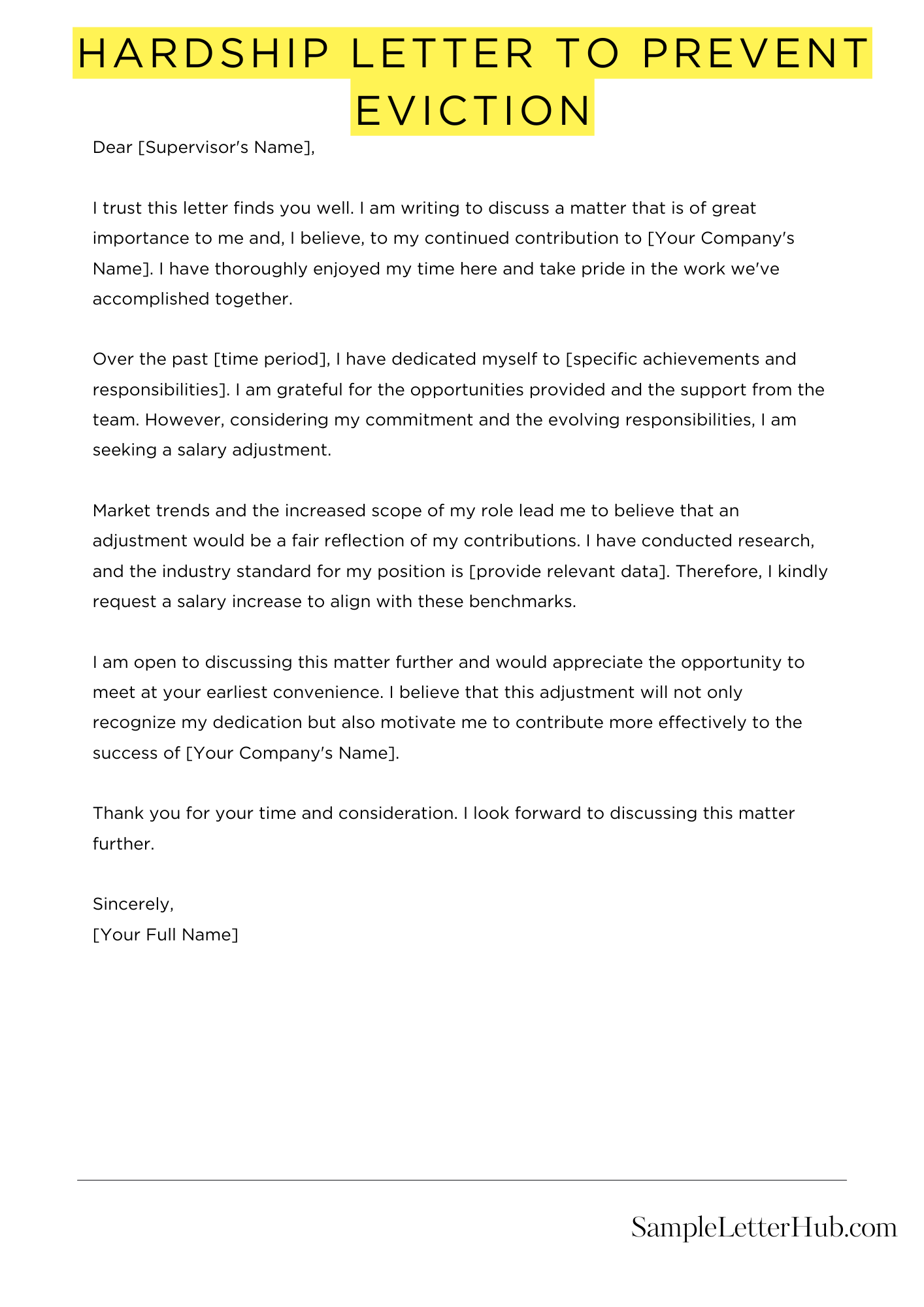If you’re facing eviction, a hardship letter can be a lifeline. It’s a formal request to your landlord asking them to reconsider evicting you due to financial hardship or other extenuating circumstances.
In this article, we’ll provide you with templates, examples, and samples of hardship letters to prevent eviction. These letters are designed to help you craft a compelling case to your landlord, explaining your situation and requesting their compassion.
Hardship Letter to Prevent Eviction
Dear [Landlord’s Name],
I am writing to request a hardship exemption from eviction due to unforeseen financial difficulties that have made it impossible for me to pay my rent on time. I have been a tenant in your property for [number] years and have always paid my rent promptly.
Recently, I lost my job due to [reason]. I have been actively searching for new employment but have not yet been successful. As a result, I have fallen behind on my rent payments. I understand the importance of paying my rent on time and am deeply sorry for any inconvenience this has caused.
I have been exploring all possible options to resolve this situation. I have applied for unemployment benefits, but the process has been slow. I have also reached out to family and friends for assistance, but they are unable to provide the necessary funds.
I am committed to fulfilling my obligation to pay my rent and am confident that I will be able to catch up on my payments once I secure employment. I am willing to work with you to establish a payment plan that is both fair and manageable.
I am a responsible tenant who takes pride in my home. I have always maintained the property in good condition and have been a quiet and respectful neighbor. I would be devastated to lose my home, especially during this difficult time.
I would be grateful if you would consider my request for a hardship exemption. I am available to meet with you at your earliest convenience to discuss this matter further.
Thank you for your understanding and consideration.
Sincerely,
[Your Name]

How to Write a Hardship Letter to Prevent Eviction
If you are facing eviction, writing a hardship letter to your landlord can be a helpful way to explain your situation and request additional time to catch up on rent.
Gather Your Documentation
Before you begin writing your letter, gather any documentation that supports your claim of hardship. This may include:
- Proof of income loss, such as a layoff notice or medical bills
- Evidence of unexpected expenses, such as car repairs or medical bills
- Letters from your doctor or social worker explaining your situation
Write a Clear and Concise Letter
Your letter should be well-written and easy to understand. Use clear and concise language, and avoid using jargon or technical terms.
Explain Your Situation
In the body of your letter, explain your situation in detail. Be specific about the reasons why you are unable to pay your rent on time.
Request a Hardship Plan
In your letter, you should also request a hardship plan from your landlord. This plan may include a reduced rent payment, a payment plan, or an extension on your lease.
Be Honest and Sincere
It is important to be honest and sincere in your letter. Do not exaggerate your situation or make false claims.
Follow Up
After you have sent your letter, follow up with your landlord to see if they have received it. You may also want to call or email them to discuss your situation further.
Seek Legal Help if Needed
If you are unable to reach an agreement with your landlord, you may need to seek legal help. An attorney can help you understand your rights and options.
FAQs about Hardship Letter To Prevent Eviction
What is a Hardship Letter?
A hardship letter is a formal document that explains your financial hardship and requests leniency from your landlord. It outlines the reasons why you are unable to pay your rent on time and provides evidence to support your claims.
What should I include in a Hardship Letter?
Your hardship letter should include the following information:
- Your name and contact information
- Your landlord’s name and contact information
- The date
- A brief explanation of your financial hardship
- Evidence to support your claims (e.g., medical bills, pay stubs, bank statements)
- A request for leniency, such as a payment plan or a temporary reduction in rent
How do I write a Hardship Letter?
There is no one-size-fits-all approach to writing a hardship letter. However, there are some general tips that you can follow:
- Be honest and upfront about your situation.
- Provide clear and concise information.
- Be respectful and professional.
- Proofread your letter carefully before sending it.
What are my chances of getting approved for a Hardship Letter?
The chances of getting approved for a hardship letter vary depending on your individual circumstances and the policies of your landlord. However, if you can provide clear and convincing evidence of your financial hardship, you are more likely to be approved.
What should I do if my Hardship Letter is denied?
If your hardship letter is denied, you should contact your landlord and try to negotiate a payment plan or other form of assistance. You may also want to consider seeking legal advice.

